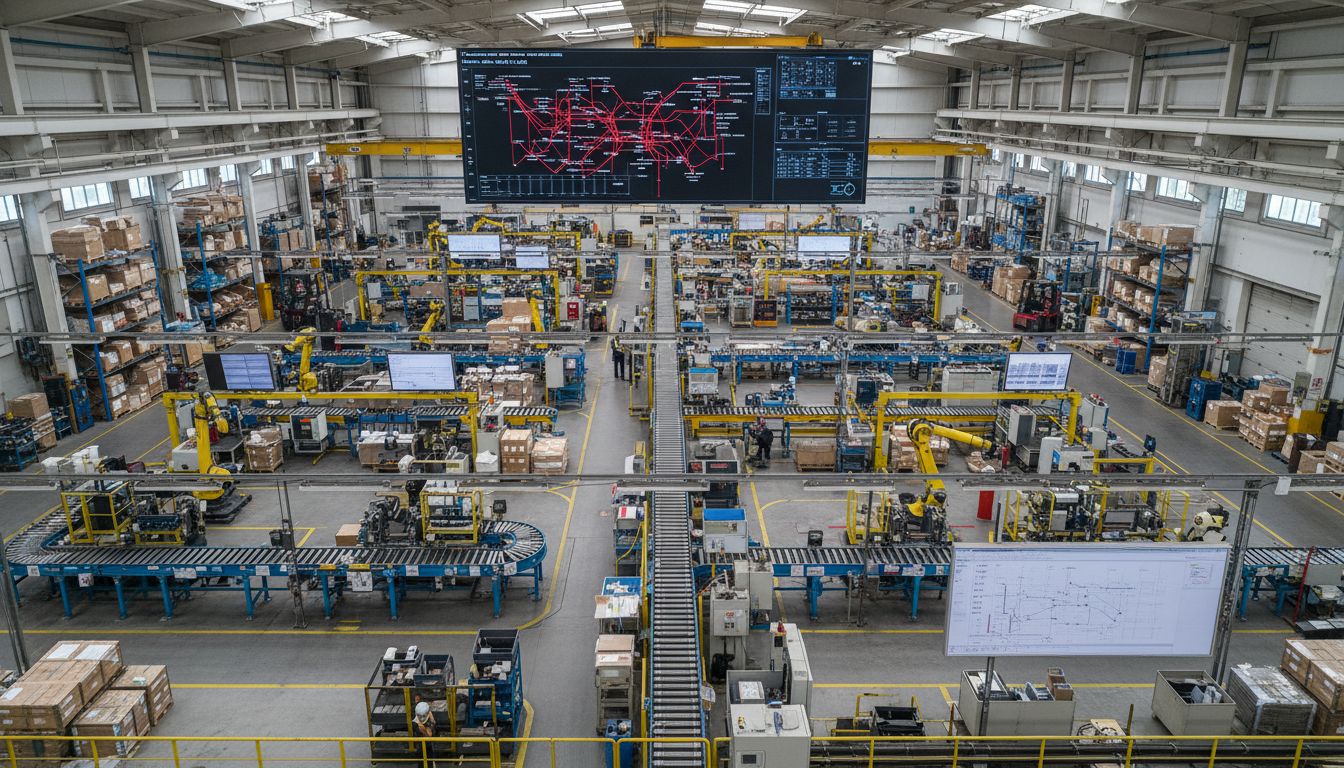Understanding the Advantages of AI for SMBs

Artificial Intelligence is no longer just for tech giants and research labs. Small businesses are using it every day to solve real problems and stay ahead. In fact, AI adoption among small businesses keeps climbing year after year according to the U.S. Census Bureau. Most people expect high-end innovation to come from big budgets. The real surprise is how AI is turning mom and pop shops into serious contenders.
Table of Contents
- What Is AI And Why Is It Relevant For SMBs?
- Exploring The Benefits Of AI In Business Operations
- How AI Enhances Customer Experience For SMBs
- Key AI Technologies And Their Applications In SMBs
- Real-World Examples Of AI Impacting Small And Medium Businesses
Quick Summary
| Takeaway | Explanation |
|---|---|
| AI enhances operational efficiency in SMBs | Automating repetitive tasks allows small businesses to reduce costs and focus on strategic activities. |
| AI empowers data-driven decision-making | SMBs can leverage AI to analyze data, forecast trends, and make informed choices swiftly. |
| Personalized customer interactions increase loyalty | AI technology enables hyper-personalization, improving customer satisfaction and retention through tailored experiences. |
| Implementing AI supports competitive advantage | SMBs can level the playing field against larger competitors by using AI strategically. |
| AI technologies enable smarter resource allocation | AI helps optimize resource use, driving productivity and minimizing waste in various business operations. |
What is AI and Why is it Relevant for SMBs?
Artificial Intelligence (AI) represents a transformative technological approach that enables machines to learn, adapt, and perform tasks traditionally requiring human intelligence. For small and medium businesses (SMBs), AI is not just a futuristic concept but a practical tool for operational enhancement and competitive advantage.
Understanding AI’s Core Principles
At its fundamental level, AI involves computer systems capable of performing tasks that typically demand human cognitive abilities. These systems use complex algorithms and massive datasets to recognize patterns, make predictions, and generate intelligent responses. Unlike traditional software programmed with rigid instructions, AI can learn from experience and improve its performance over time.
AI technologies like machine learning, natural language processing, and predictive analytics enable businesses to transform raw data into actionable insights. According to the U.S. Small Business Administration, AI can help SMBs solve complex problems, enhance decision making, and automate repetitive tasks with unprecedented efficiency.
Strategic Relevance for Small Businesses
For SMBs, AI is not about replacing human workers but empowering them to work smarter. The technology offers significant advantages that can level the playing field against larger competitors:
- Reduce operational costs through intelligent automation
- Enhance customer experience with personalized interactions
- Make data-driven decisions quickly and accurately
- Optimize resource allocation and productivity
- Identify emerging market trends and opportunities
By integrating AI strategically, small businesses can unlock new potential for growth, innovation, and competitive differentiation.
The table below provides a comparison of major AI benefits for SMBs mentioned throughout the article, highlighting how these advantages translate to practical business improvements.
| AI Benefit | How It Helps SMBs | Impact on Business Operations |
|---|---|---|
| Operational Efficiency & Automation | Automates repetitive tasks, reduces human error | Saves time, lowers costs, enables focus on strategy |
| Data-Driven Decision Making | Transforms data into actionable insights for quick decisions | Improves accuracy, competitiveness, and agility |
| Enhanced Customer Experience | Personalizes interactions and support | Increases loyalty, satisfaction, and retention |
| Smarter Resource Allocation | Optimizes use of personnel, inventory, and time | Minimizes waste, boosts productivity |
| Competitive Advantage | Levels the playing field against larger competitors | Accelerates innovation and differentiation |
| The key is approaching AI as a collaborative tool that amplifies human expertise rather than a replacement for human judgment. |

Exploring the Benefits of AI in Business Operations
AI technologies are revolutionizing how businesses operate, offering unprecedented opportunities for efficiency, innovation, and strategic growth. By transforming complex data into actionable insights, AI enables organizations to make smarter decisions and optimize their operational processes.
Operational Efficiency and Automation
One of the most significant advantages of AI in business operations is its ability to automate repetitive and time-consuming tasks. Intelligent automation allows businesses to streamline workflows, reduce human error, and allocate human resources to more strategic and creative endeavors. From data entry and document processing to customer service interactions, AI-powered systems can perform multiple tasks simultaneously with remarkable accuracy.
According to Coursera’s analysis of AI in business, companies implementing AI technologies can experience substantial improvements in productivity and operational efficiency. These systems continuously learn and adapt, becoming more sophisticated and precise with each interaction.
Data-Driven Decision Making
AI transforms raw data into comprehensive insights, enabling businesses to make more informed and strategic decisions. By analyzing vast amounts of information rapidly, AI helps organizations:
- Identify emerging market trends
- Predict customer behavior
- Assess potential risks
- Optimize resource allocation
- Enhance financial forecasting
These capabilities are particularly powerful for small and medium businesses that need agile, data-informed strategies to compete effectively in dynamic markets. AI provides a level of analytical depth previously accessible only to large corporations with extensive research departments.
Enhanced Customer Experience
AI technologies enable businesses to deliver personalized, responsive customer experiences that were impossible just a few years ago. Chatbots, predictive customer service tools, and intelligent recommendation systems can provide instantaneous, tailored interactions that improve customer satisfaction and loyalty. By understanding individual customer preferences and behaviors, businesses can create more targeted marketing strategies and proactively address potential concerns before they escalate.
How AI Enhances Customer Experience for SMBs
Customer experience has become a critical differentiator for small and medium businesses, and AI technologies are revolutionizing how companies interact with and understand their customers. By leveraging intelligent systems, SMBs can create more personalized, responsive, and engaging customer interactions that were previously impossible.
Personalized Customer Interactions
Artificial Intelligence enables hyper-personalization by analyzing customer data, preferences, and behavior patterns. This allows businesses to create tailored experiences that feel individually crafted for each customer. AI-powered systems can track purchasing history, predict future needs, and recommend products or services with remarkable precision. Unlike generic marketing approaches, these intelligent recommendations feel intuitive and genuinely helpful to customers.
According to research from Sacred Heart University, AI adoption helps SMBs develop more responsive customer service strategies that build deeper customer loyalty and engagement.
Intelligent Customer Support
AI transforms customer support by providing instant, 24/7 assistance through advanced technologies like chatbots and intelligent response systems. These tools can handle multiple customer queries simultaneously, offering:
- Immediate response times
- Consistent information delivery
- Multilingual support
- Complex problem-solving capabilities
- Reduced wait times
By implementing AI-driven support systems, small businesses can compete with larger organizations in customer service quality, providing professional and efficient interactions without significant infrastructure investments.
Predictive Customer Insights
Beyond immediate interactions, AI helps businesses anticipate customer needs before they arise. By analyzing historical data and current trends, intelligent systems can predict potential customer challenges, preferences, and future purchasing behaviors. This proactive approach allows businesses to:
- Develop targeted marketing campaigns
- Create more relevant product offerings
- Prevent potential customer service issues
- Improve overall customer satisfaction
The result is a more connected, responsive business model that makes customers feel genuinely understood and valued.
Key AI Technologies and Their Applications in SMBs
Artificial Intelligence encompasses a range of sophisticated technologies that enable small and medium businesses to transform their operational capabilities. Understanding these technologies is crucial for strategic implementation and gaining competitive advantages in today’s digital landscape.
Below is a table summarizing the primary AI technologies mentioned in the article and their main applications for small and medium businesses.
| AI Technology | Description | Example Applications |
|---|---|---|
| Machine Learning & Predictive Analytics | Computers learn from data to predict outcomes and identify patterns | Sales forecasting, inventory management, customer segmentation |
| Natural Language Processing (NLP) | Machines interpret and generate human language | Chatbots, sentiment analysis, document processing |
| Computer Vision | Interprets and analyzes visual information | Quality control, security monitoring, customer behavior analysis |
| Intelligent Automation | Combines AI with workflows to automate tasks | Data entry, customer support, email filtering |
Machine Learning and Predictive Analytics
Machine learning represents the foundation of intelligent business systems, allowing computers to learn from data without explicit programming. For SMBs, this technology translates complex information into actionable insights. Predictive analytics powered by machine learning can forecast market trends, customer behaviors, and potential business risks with remarkable accuracy.
Businesses can utilize machine learning for various applications such as sales forecasting, inventory management, and customer segmentation. These intelligent systems continuously improve their predictions by analyzing historical data and identifying intricate patterns that human analysts might overlook.
According to America’s SBDC AI U program, machine learning technologies are becoming increasingly accessible for small businesses seeking data-driven decision-making capabilities.
Natural Language Processing and Intelligent Automation
Natural Language Processing (NLP) enables machines to understand, interpret, and generate human language. For SMBs, this technology offers powerful tools to enhance communication and operational efficiency:
- Automated customer support chatbots
- Real-time translation services
- Sentiment analysis of customer feedback
- Automated document processing
- Email and communication filtering
Intelligent automation combines NLP with robotic process automation, allowing businesses to streamline repetitive tasks and allocate human resources to more strategic activities. This approach reduces operational costs and minimizes human error.
Computer Vision and Advanced Recognition Technologies
Computer vision technologies enable machines to interpret and understand visual information, opening new possibilities for SMBs across various industries. From quality control in manufacturing to security monitoring and customer behavior analysis, these technologies provide unprecedented insights. Advanced recognition systems can quickly process images, detect anomalies, and generate comprehensive reports, transforming how businesses approach visual data analysis and decision-making.
Real-World Examples of AI Impacting Small and Medium Businesses
Artificial Intelligence is no longer a theoretical concept but a practical tool transforming how small and medium businesses operate across various industries. By implementing intelligent technologies, SMBs can solve complex challenges, optimize operations, and create innovative solutions that previously seemed out of reach.
Retail and Customer Experience Innovations
AI is revolutionizing retail experiences for small businesses by enabling hyper-personalized shopping interactions. Local boutiques and online retailers are using machine learning algorithms to analyze customer preferences, predict purchasing behaviors, and create tailored recommendations. For instance, small clothing stores can now offer virtual fitting rooms and personalized style suggestions based on individual customer data.
These intelligent systems help businesses understand customer trends, manage inventory more efficiently, and create targeted marketing campaigns that significantly improve conversion rates. The ability to predict customer needs before they arise gives small businesses a competitive edge traditionally reserved for large corporations.

According to U.S. Census Bureau’s Business Trends Survey, AI adoption among small businesses is steadily increasing, demonstrating the technology’s practical value.
Manufacturing and Operational Efficiency
Manufacturing SMBs are leveraging AI technologies to enhance quality control, predict maintenance needs, and optimize production processes. Intelligent computer vision systems can now:
- Detect microscopic product defects
- Monitor equipment performance
- Predict potential machinery failures
- Optimize supply chain logistics
- Reduce waste and improve resource allocation
Small manufacturing businesses can now compete with larger enterprises by implementing sophisticated AI-driven quality control and predictive maintenance systems that were previously too expensive and complex.
Agricultural and Service Industry Transformations
AI is enabling small businesses in agriculture and service industries to make data-driven decisions with unprecedented precision. From local farms using AI-powered crop monitoring to small landscaping businesses optimizing route planning, intelligent technologies are creating new opportunities for efficiency and growth. These technologies translate complex data into actionable insights, allowing businesses to reduce costs, minimize environmental impact, and improve overall operational performance.
Turn AI Insights Into Real Results For Your Business
Reading about the advantages of AI for SMBs is a powerful first step. But many mid-sized business owners quickly discover that “knowing” is different from “doing.” You might recognize the value of automating repetitive tasks, improving decision-making, and boosting team morale with AI. Yet, figuring out where to start or how to adapt these concepts to your unique operations can feel overwhelming. Does your team need guidance turning data into action? Are you looking for a partnership that bridges the gap between AI theory and day-to-day business impact?

At Average Robot, we help business owners like you make sense of AI and get actual results. Our team works side-by-side with you to build custom AI roadmaps, automate tedious processes, and increase your company’s valuation. We walk you through every step using proven playbooks and clear language, so you gain an edge without the jargon. Business moves fast. Contact Average Robot now to start using AI as a true competitive advantage. Don’t wait until your competitors figure it out first—see what a dedicated AI Council can do for your growth journey today.
Frequently Asked Questions
What is AI, and how is it relevant for small and medium businesses (SMBs)?
AI, or Artificial Intelligence, involves computer systems that perform tasks traditionally requiring human intelligence, such as learning, adapting, and making decisions. For SMBs, AI helps enhance operations, reduce costs, and gain a competitive edge by automating tasks and providing data-driven insights.
How can AI improve customer experience for SMBs?
AI can significantly enhance customer experience by providing personalized interactions, intelligent customer support through chatbots, and predictive customer insights that allow businesses to anticipate customer needs and preferences.
What are some practical applications of machine learning for SMBs?
Machine learning can be used in various applications such as sales forecasting, customer segmentation, inventory management, and predicting market trends. These applications help SMBs make informed, data-driven decisions efficiently.
What benefits does AI bring to operational efficiency in small businesses?
AI improves operational efficiency by automating repetitive tasks, reducing human error, and enabling smarter resource allocation. Through intelligent automation, SMBs can streamline workflows and focus human resources on more strategic tasks.
Recommended
- 5 Costly Mistakes Businesses Make When Implementing AI…What Successful Business Owners Do Differently. — Average Robot
- The Cost of Waiting: Why AI Adoption Delays Hurt SMBs — Average Robot
- AI and Productivity: Why SMBs Can’t Afford to Wait — Average Robot
- The Real Impact of AI on Your SMB: Beyond the Hype — Average Robot
- The Impact of AI on SEO in 2025: Key Changes for Businesses




